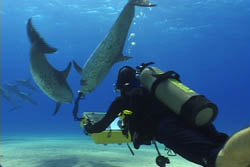October 11, 2009. Quebec City, Canada
by Hardy Jones
The following is taken from my hastily scratched notes during the Environmental Health Workshop.
In the early days the Society of Marine Mammalogy bi-ennial meetings were devoted to identification and distribution of whales, dolphins, manatees, and analysis of feces of various species of marine mammal from Patagonia to the Arctic. There were always a few reports on the songs of humpback whales.
At the Cape Town meeting two years ago there was a marked increase in the number of papers on contamination of the marine environment by toxic chemicals and their impact on the health of marine mammals and even humans. It was the first time I’d heard discussion of the concept of zoonosis - the transfer of disease between species, including animal to human animal and human animal to other animal species.
Here in Quebec environmental contamination and zoonosis are among the principal topics in the Emerging Infectious Diseases in the Marine Ecosystem workshop. The bottom line of the discussion is that unprecedented environmental changes are taking place worldwide brought about by urbanization, rapid global transportation and global climate change.
Interspecies disease transfer is not a new concept. AIDS is thought to have arisen through blood contact when a human killed a monkey in central Africa for food. The same is thought to be true for Avian Influenza (bird flu) and swine flu (H1N1).
Trichinella, a member of a genus of parasitic roundworms, causes trichinosis, a disease once feared among those eating pork. Trichinella is now being found in Ringed Seals and possibly in Walrus that have been forced to eat ringed seals due to a decline in their normal prey due to overfishing and climate change. Inuit hunt Walrus for food. It is unknown whether eating walrus constitutes a health threat for those Inuit.
Carlos Yaipen-Llanos of the Peruvian group ORCA, reports an increase in diabetes in northern Peru among fishermen who eat dolphins. The increase in disease incidence does not occur among members of the same village who do not eat dolphin meat. Incidence of diabetes among Peruvians in general is quite low.
Japan was listed among those nations that are hot spots of risk for zoonotic events. Drug resistance has been identified in Japan along with many new pathogens. The combination could lead to a superbug that would not respond to antibiotics.
The conference itself begins October 12.
Subscribe to:
Post Comments (Atom)


1 comment:
is amazing the relationship between generic propecia
humans and dolphins.
is unique it is as if dolphins could talk.
it is good your website is good to know how we communicate with them
Post a Comment